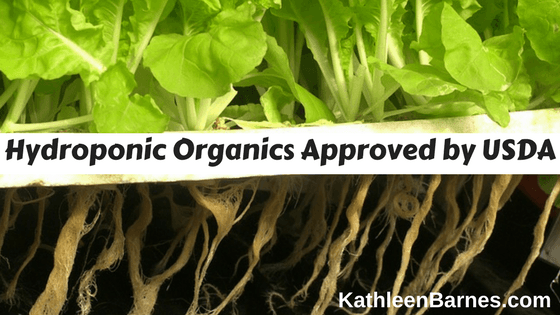If you think organic vegetables and berries should be wholesome, pure and grown in rich black earth, you wouldn’t be alone. But the US Department of Agriculture just destroyed that myth yesterday by allowing hydroponically grown vegetables to be certified organic.
Hydroponic vegetables and berries have inexplicably slid under the organic regulations for several years. A group of longtime organic farmers this week lost its effort to remove the organic label from hydroponic produce.
If you’re not familiar with hydroponics, by definition, it means growing plants in huge greenhouses without sun or soil. The roots are submerged in a liquid medium, usually water, and then flushed with mineral and nutrient solutions.
This is in direct opposition to the definition of organic, which has, until Thursday, been defined as plants grown under a crop rotation plan that maintains or improves soil organic matter.
The Organic Trade Association (think Big Business of organics, not your quaint family farmer) has succeeded in getting these rules re-written, essentially dismantling everything “organic” means and leaving us consumers more confused than ever.
For its part, the OTA says that tomatoes, for example, can be grown in as little at 10% of the water required to grow tomatoes in soil and takes far less land for production.
Yes, less water, less land, no sun and “nutrients” that can include manure from pesticide intensive fish and duck farming. What exactly is natural about that?
There are lots of problems here. One is that hydroponic production allows certain chemicals that are not permitted in organic growing soil. I wish I could tell you what hydroponic producers use in their nutrient solutions, but it appears that no one knows because the growers say that information is secret. So is it really organic or isn’t it? How will we ever know?
This goes right along the lines of the GMO labeling controversy. We don’t have a right to know the origins of our food and we have no tools to discern whether our food is safe or not. It is a crisis.
Unless you grow all of your own food–and who can possibly do that, even if you have your own farm—you can’t know for sure.
We do know a few things for sure:
- According to Brazilian research published in the Journal of Agriculture and Food Chemistry in 2003, hydroponically grown lettuces and leafy vegetables had significantly lower levels of the vital carotenoid nutrients than conventionally grown non-organic vegetables.
- Hydroponically grown vegetables are also documented to have higher levels of the bacteria Salmonella, probably due to the high humidity growing environment.
- Organic coils have many nutrients beyond the minerals added in hydroponic growing. The healthy bacteria (probiotics—why it’s good to let your kids play in the dirt), fungi and nematodes all contribute to part of the whole nutritional picture that simply cannot be achieved by separating out a single element.
- Sadly, Monsanto’s name keeps popping up in this battle. The RoundUp and GMO giant has its fingers everywhere. Why not here, too?
Now that the USDA has confirmed that it will certify hydroponically grown foods as organic and we will have no way of knowing how our food was grown, our options have become limited.
Next growing season, we do have some options. Since for most of us, the growing season has ended we’re pretty much stuck.
Aside from growing all of our own food, yes, we can buy our foods from local farmers who we can quiz on their growing methods.
We can join CSAs (Community Support Agriculture) coops.
One last thought: We can vote with our wallets, I’m the first to admit I like to eat tomatoes and lettuce and berries year-round.
I’m a big fan of the supermarket chain, Aldi. It’s a source of clean food and lots of reasonably priced and high quality organic and gluten-free foods. Aldi is in the midst of a huge $3.4 billion expansion effort all over the country and it is a corporation with reputation of honesty and integrity. Why not use our collective buying power to pressure Aldi to proclaim the source of its organic produce? It will also pressure other supermarket chains to follow suit.
Contact Jason Hart, CEO of Aldi, Inc. The address is: 1200 North Kirk Road, Batavia, IL 60510-1477, phone: (630) 879-8100, fax: (630) 879-8114. The company’s website doesn’t include an e-mail address for Hart, but here are some possibilities: JHart@aldi.us, Jason.Hart@aldi.us. Let’s let Aldi hear from us since the USDA won’t listen!







